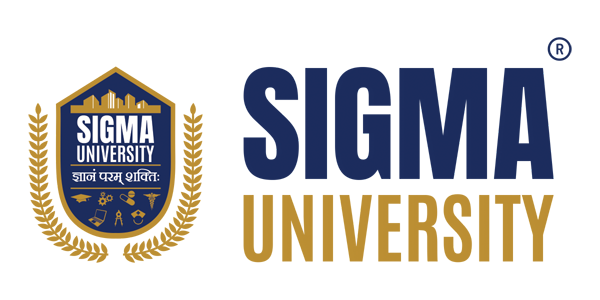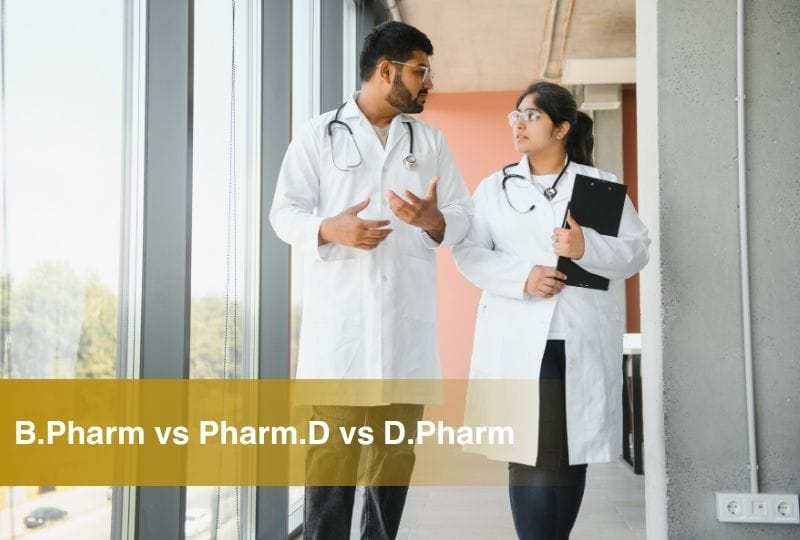Choosing the right pharmacy course after 12th is an important decision for students who aspire to build a career in healthcare, pharmaceuticals, or research. With multiple options available, such as Bachelor of Pharmacy (B.Pharm), Doctor of Pharmacy (Pharm.D), and Diploma in Pharmacy (D.Pharm), students often find themselves confused about which path to pursue. Each program has distinct features, career opportunities, and academic requirements that cater to different career goals.
In this guide, we shall give you a detailed breakdown of these various courses, namely B.Pharm, Pharm.D, D.Pharm, in terms of education requirements, duration eligibility, course outline, career paths, and expected salaries upon employability.
Overview of Pharmacy Education in India
The Pharmacy Council India (PCI) and the AICTE ensure that there is uniformity in standards of pharmacy education on Diploma, Undergraduate, and Doctoral programs. The levels of education descend to D.Pharm (2 years plus diploma), to B.Pharm (4 years period + degree), to Pharm.D (6 years + professional doctorate). With the booming of the pharmaceutical market and an array of celebrating roles, including redistributing pharmaceuticals to clinical research, it is crucial to know the scopes of each one.
B.Pharm (Bachelor of Pharmacy)
Course Overview
B.Pharm is a four-year undergraduate program that covers pharmaceutical chemistry, biopharmaceutics, pharmacology, ethics, and drug delivery systems. It seesaws between scientific theory and industrial experience through labs and internships, providing the foundation to work in industry, research, or as regulators.
Eligibility & Duration
Applicants must have a 10+2 with Physics, Chemistry, and Biology/Mathematics, and at least 60 percent in most cases. The program can be done in eight semesters, and diploma passers have the opportunity of entering the second year through a lateral entry program.
Fees & Admission Process
In Sigma University, the B. Pharm tuition fee is about 3.48 lakh, with hostel facility costing approximately 4.91 lakh. Applying is through Class 12 results and completing the institutional procedures of admission.
Career Options After B.Pharm
Graduates can be employed as clinical pharmacists, drug inspectors, quality control analysts, research associates, and medical representatives. The typical jobs available are work in the area of public administration, work in a hospital pharmacy, and a chance in a pharmaceutical company.
Salary & Scope
Starting salaries range between ₹3–6 LPA; with experience, M.Pharm, or Pharm.D, this can increase substantially, especially in clinical or regulatory roles.
Pharm.D (Doctor of Pharmacy)
Course Overview
Pharm.D is a professional doctoral degree that takes a five-year program of intense learning followed by a one-year clinical internship or residency. It is focused on clinical pharmacy, patient consultations, disease management, pharmacovigilance, and drug therapy optimization.
Eligibility & Duration
Candidates must have completed 10+2 in the science stream. The duration is strictly six years (5 years academics + 1 year internship)
Fees & Admission Process
Pharm. D. programs are more expensive. Yearly fees can amount to 2 lakh in private colleges, unlike as low as 3,000 in government colleges in the case of B.Pharm. Admission is normally on the basis of evaluation of merit, sometimes including evaluation of clinical aptitude.
Career Options After Pharm.D
Upon graduation, students become eligible to take on clinical pharmacist roles, leadership in hospital pharmacies, university teaching, pharmacovigilance, and to use the prefix ‘Dr’. They are regularly leaders of Drug Information Centers or of drug safety advisors
Salary & Scope
Clinical and leadership roles command higher pay, often between ₹6–10 LPA initially, and scale further with clinical experience or institutional affiliation.
D.Pharm (Diploma in Pharmacy)
Course Overview
A two-year diploma majoring in foundational pharmacy practice, drug compounding, dispensing, pharmacology, pharmaceutical chemistry, and ethics. Emphasis is placed on practical skills to be productively employed immediately.
Eligibility & Duration
Eligibility requires 10+2 with PCB or PCM. Duration is two years, and graduates are eligible to register as pharmacists and may also enter B.Pharm through lateral entry.
Fees & Admission Process
D.Pharm in Sigma University has an annual tuition fee of 74,200, and the admission takes place on a merit basis along with an application. The online process involves web-based submission of a form and attachment of documents, payment, and validation.
Career Options After D.Pharm
Graduates often begin in retail or hospital pharmacies, serve as pharmacy technicians, assistants, or store management support, and can upgrade to B.Pharm via lateral entry.
Salary & Scope
Initial salaries typically range from ₹1.5–4 LPA. The diploma offers quicker job entry but limited growth unless followed by degree-level education.
Side-by-Side Comparison Table
Course | Duration | Depth & Scope | Eligibility | Fees(approx) | Career Start Roles | Advancement Potential |
D.Pharm | 2 years | Practical-focused | 10 + 2 PCB/PCM | ₹74,200/year | Pharmacist, Technician | Limited without further qualification |
B.Pharm | 4 years | In-depth theoretical+ practical | 10 + 2 + 60% PCB/PCM | ₹3.48 L total (Sigma) | Clinical roles, research, industry | High with M.Pharm/Pharm.D |
Pharm.D | 6 years | Advanced clinical doctorate | 10 + 2 science | Up to ₹2 L per year (private) | Clinical pharmacist, hospital leader | Highest clinical career |
Which Pharmacy Course Should You Choose?
Based on Career Goals
Choose D.Pharm if you aim to enter the pharmacy workforce quickly. Opt for B.Pharm if looking for breadth in pharmaceutical sciences, research, or managerial roles. Pharm.D is ideal for clinical and direct patient-care roles and commands high respect and remuneration.
Based on Budget & Duration
D.Pharm is the shortest and most affordable. B.Pharm balances cost and depth. Pharm. D. offers premium clinical training but requires greater time and financial commitment.
Based on Salary & Growth
For long-term growth and diverse roles, B.Pharm lays a robust foundation. Pharm.D leads to specialized, higher-paying roles. D.Pharm offers lower entry earnings but can track upward via further study.
Future Scope of Pharmacy in India & Abroad
India’s pharmaceutical industry is rapidly expanding, projected to grow from USD 42 billion to USD 130 billion by 2030, driven by generics, research, and global exports. Clinical pharmacy roles are increasing domestically and internationally. Pharm.D graduates, especially, are favored for clinical and research roles due to healthcare system modernization. Pharmacy professionals also find opportunities in regulation, policy, and entrepreneurship, both within India and abroad.
Conclusion
Each pharmacy course offers unique paths:
- D.Pharm provides quick entry into pharmacy practice,
- B.Pharm offers a balanced, comprehensive degree with solid career prospects,
- Pharm.D is suited for those seeking clinical authority and advanced healthcare roles.
Your best choice depends on your career aspirations, financial capacity, and commitment to education. Institutions like Sigma University provide well-structured D.Pharm and B.Pharm programs in Vadodara, with PCI and AICTE approvals, making them valuable starting points for aspiring pharmacists.
Whichever path you choose, pharmacy offers stability, global relevance, and the opportunity to contribute meaningfully to healthcare.
Frequently Asked Questions (FAQs)
Which is better: B.Pharm or Pharm.D?
B.Pharm is a 4-year undergraduate course focusing on pharmaceutical sciences, drug formulation, and industry roles. Pharm.D is a 6-year professional doctorate emphasizing clinical pharmacy and direct patient care. The better choice depends on career goals, industry jobs, research, and manufacturing suit B.Pharm, while hospital pharmacy, clinical practice, and healthcare roles align more with Pharm.D.
Is a D.Pharm enough to become a pharmacist in India?
Yes, a Diploma in Pharmacy (D.Pharm) qualifies graduates to register as licensed pharmacists with the Pharmacy Council of India. With this diploma, one can work in retail or hospital pharmacies. However, career growth opportunities in research, higher studies, or pharmaceutical companies are broader with advanced degrees like B.Pharm, M.Pharm, or Pharm.D.
Can I open a medical store after D.Pharm?
Yes, after completing a D.Pharm and registering with the State Pharmacy Council, you are legally eligible to open a medical store in India. You must obtain a retail drug license from the Drug Control Department. While D.Pharm provides eligibility, many prefer B.Pharm for broader career opportunities in addition to running a pharmacy business.
Is NEET required for Pharm.D admission?
No, NEET is not required for admission to Pharm.D in India. Admission is usually based on marks obtained in Class 12 (PCB/PCM) or state-level entrance tests. Pharm.D is a professional program focusing on clinical pharmacy and patient care, but the selection process varies across universities, so students should check specific eligibility requirements.
Can I do M.Pharm after D.Pharm?
No, you cannot directly pursue M.Pharm after completing a D.Pharm. Since M.Pharm is a postgraduate program, students must first complete a B.Pharm degree. D.Pharm holders can either enter the workforce as licensed pharmacists or opt for lateral entry into B.Pharm to continue their academic and career progression toward M.Pharm specialization.
Is pharmacy a good career option for the future?
Yes, pharmacy is a promising career with expanding opportunities in India and abroad. The rise of pharmaceutical industries, clinical trials, hospital pharmacy, and healthcare innovation ensures a strong demand for pharmacists. With degrees like B.Pharm, M.Pharm, or Pharm.D, graduates can explore careers in research, manufacturing, patient care, and entrepreneurship, ensuring stability and growth.


